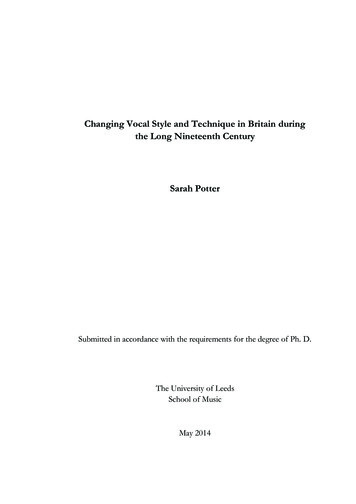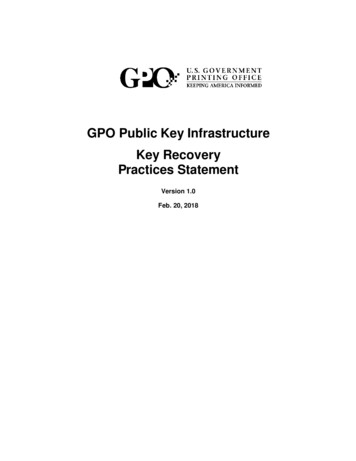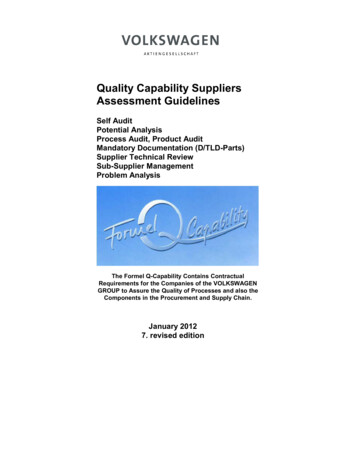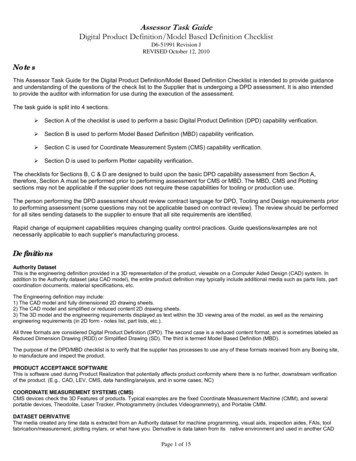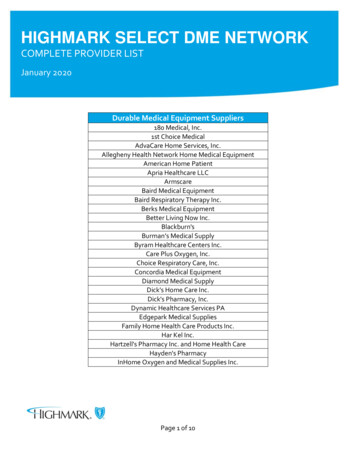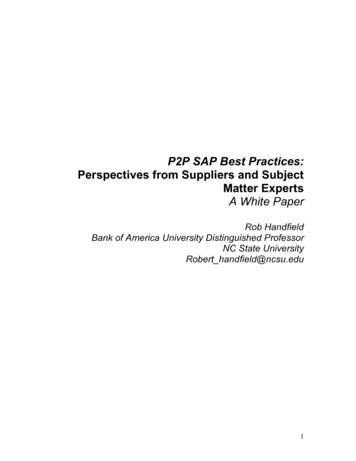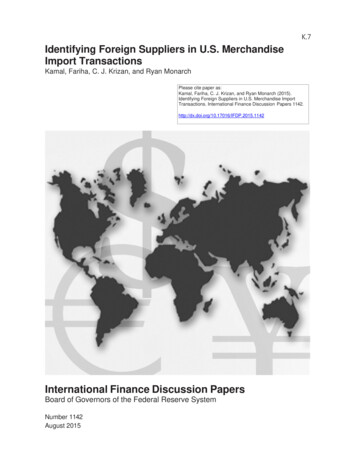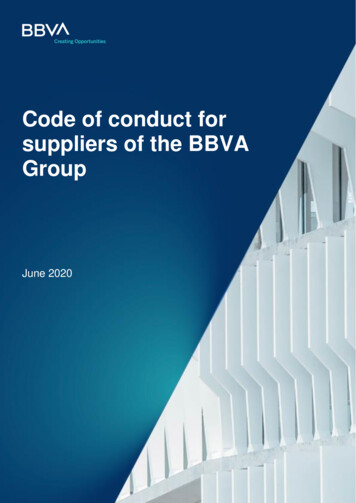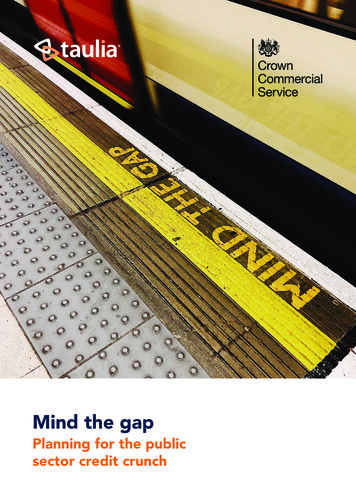
Transcription
Mind the gapPlanning for the publicsector credit crunch
Encouraged by the government, public sectorbuyers acted fast to speed up payment tosmaller suppliers in the early stages of the Covidpandemic. Now many of those same supplierspotentially face a ‘cash flow cliff’ if early paymentcomes to an end. What can public sectorsbodies do to make sure a good deed doesn’t endup damaging the suppliers they aim to help?Supporting Britain’s key suppliersWhen the likely scale and impact of the Corona viruspandemic on small businesses became apparent, theresponse of the UK’s public sector was fast and effective.In March 2020, Cabinet Office Procurement Policy Note02/20 (PPN 02/20 for short) made it clear that contractingauthorities should do everything they could to supportsupplier cash flow, ensuring that, ‘Invoices submitted bysuppliers are paid immediately on receipt (reconciliationcan take place in slower time) in order to maintain cashflow in the supply chain and protect jobs.’What the guidance meant in practice was that the usualpayment terms would temporarily be suspended in favourof getting the cash out as fast as possible. Suppliers could,in effect, be paid on receipt of invoice.For many suppliers, that policy has been a lifeline. Withother customers often unable or unwilling to pay on theirusual terms, a reliable income stream from the publicsector has made the difference between surviving orgoing under.However, PPN 02/20 (and its successor PPN 04/20) onlyapplied up to 31st October. For small businesses whohave come to rely on the cash flow generated by instantpayment from public sector customers, the shock ofwithdrawal could be fatal. While public sector organisationswere doing the right thing by paying as early as possible,Lewis Mitchell, senior director EMEA at Taulia, has beensupporting dozens of public sector organisations throughthe crisis.“Public sector organisations have done a good thing forsuppliers by accelerating payment. There’s no doubt aboutthat,” he says. “But contracting authorities are inevitablygoing to move those suppliers back to terms, which could putpressure on them and not only stifles their recovery, but maypush the supplier over the brink. That’s a risk to financial supplychains across the country.”Philip King, the government’s own small businesscommissioner, also recognises the issue as a serious one.“It isn’t just payment terms,” he says. “Public sector bodies mayhave relaxed requirements around, for example, three-waymatching of invoices which will return as we move closerto normality. Suppliers will also have to face deferred rent,deferred taxation, and loans which will become payable.”So, just as the gradual return of customers offers the chanceof survival for many small businesses, the withdrawal of nearinstant payment may doom them to a cash flow crisis.King, himself in regular contact with small business ownersand managers, is already seeing, “A very real fear ofuncertainty - spreading a sense of unease in people’s minds.”they may have been storing up a still bigger problem forthe future where those instant payments are ceased. 02
Managing the transitionPublic sector buyers don’t want to see their suppliers come through the worstof the pandemic only to fold as things return to normal, so there is a clearneed for a transition plan to help the most vulnerable.Paul Allison, deputy director and head of financial services at the CrownCommercial Service, has been at the forefront of helping public bodies payfaster during the pandemic through measures such as increased use ofpayment cards.Allison is optimistic that some of the faster payment practices that haveemerged in response to the virus may be here to stay - but he recognisesthat public sector buyers must be careful about how they manage the shiftback to longer payment terms. The first step is to take a good look at theentire supplier chain.If you look across any organisation’s supply base, you’re not going to find that all suppliers are in the same financialposition. You need to understand your suppliers, those that have done okay and those that have struggled. It wouldseem to me to make absolute sense to continue to pay that last category quickly.Paul AllisonDeputy Director and Head of Financial Services Crown Commercial ServiceSo, as we move toward the likely expiry of PPN 02/20 and itssuccessors at the end of October, every public sector bodyneeds a plan to manage the transition from emergencypayment terms to something like normality. What mightthat plan look like?A five-step plan for public sector supply chain security1Analyse your supplier base2Examine possible solutions3Develop a plan to implement the changes4Communicate the change5Monitor progress 03
1Analyse your supplier baseAs Paul Allison suggests, the first step is to analyse your supplier base,identifying those businesses that are most in need of support.For some authorities, this will be a case of manual work with spreadsheetsand email to find businesses that have previously requested earlierpayment or contacted the authority directly to highlight their distress.Authorities with a robust accounts payment platform in place have anadvantage here as the data for this exercise should be readily available.2Examine possible solutionsHaving identified those suppliers most in need of support, step two is to examine possible approaches to the endof what we might call ‘emergency payment terms’. Here there are four options:Move directly back to the paymentterms in place before the pandemicMake the change to instantpayment terms permanentThis could be summarised as ‘ripping off the stickingFor public sector bodies who are ‘cash-rich’ and notplaster’ - getting the pain over with as fast as possible.looking for savings opportunities, it may be possibleIt has the benefit of clarity but needs to be handled withto simply continue to pay faster. For most, however,care. For firms whose cash flow is now based on instantthis won’t be practical, because internal processespayment, it could leave a dangerous gap which couldsuch as three-way matching, when reintroduced,exhaust their working capital and push them to thewill slow things down - and accelerating thoseedge of failure.approval processes is resource intensive, so entailsan additional hidden cost.Offer a phased returnto terms, giving businessthe time to adapt to the new realityContinue to offer early payment usingsupplier finance or dynamic discountingFor many, this will be the most obvious approach.payment terms, it can still be possible for a supplierHowever, it does risk merely prolonging the pain andleaving many businesses still unable to cope whenfaster payment is, eventually, withdrawn.When a public sector buyer returns to standardto be paid well in advance of those terms by usingsupplier finance or dynamic discounting from Taulia,which has been approved by the Crown CommercialService itself (see box). Paul Allison describes supplierfinance as “An extra tool in the box, and not only forthose who are struggling financially. It is, of course,also a way in which a public sector organisation cangenerate a bit of income for itself, which I absolutelyknow is critical at this point.” 04
The Taulia SolutionTaulia’s solution offers two types of early payment. Both allow thesupplier to choose when they are paid. If they are happy with standardterms, that’s fine, but if they wish, they can be paid earlier than that at asmall discount which increases the earlier the payment is requested.Supply Chain Finance uses third-partyDynamic Discounting uses the buyer’s- for example, on approval of an invoice. Thethis solution, the discount on the invoice isbuyer then pays the third-party back at theretained by the buyer which can help reduceoriginal due date of the invoice.the cost of the goods and services it buys.funding to pay a supplier on an agreed dateown cash to fund the programme. WithOnly Taulia’s clients can switch between the two forms of finance as their circumstances change.3Develop a plan to implement the changesIf you’ve decided to adopt any but the first option“The good news is that Taulia is sole supplier under theabove, you will need to plan your implementationCCS framework, which means that we can be procuredcarefully. This is especially important if you plan towithout the need to run a fresh OJEU process fromimplement a supplier finance programme when yourscratch. We’re the sole supplier under that framework.choice of technology and funding provider is key toThat means that we can be directly awarded, so theyour success.contracting process, the procurement activity, and theTaulia’s system has already connected more than2 million suppliers and processes 400bn worth ofinvoices annually.As Lewis Mitchell says: “Before the pandemic, a largenumber of public sector organisations were alreadylooking at programmes like ours, so they are notneed for a pricing conversation have already beenconcluded.”Taulia has implemented supplier finance solutions inas little as eight weeks - though Mitchell recommendsallowing three months depending on your ITinfrastructure.coming at this from a standing start.” 05
4Communicate the changeWhichever route you choose, your plan won’t help your suppliers if theyaren’t aware of it or don’t understand it. Small Business Commissioner PhilipKing puts it this way: “Communication is key for those involved. If a publicbody is going to rewind early payment, then planning is essential to givesmall businesses time to ask for a phasing in of the return to normality.”Conversely, if early payment is going to continue (whether or not involvingdiscounts), buyers need to tell suppliers early. Otherwise, they could befocusing on working capital unnecessarily and potentially holding backfrom the investment they need to grow. Smaller suppliers will have theirhands full dealing with the operational aspects of a return to regulartrading, so don’t expect them to be immediately aware of the likely impactof any changes you make.5Monitor ProgressWhatever route you decide to take in supporting your smaller suppliers, it is essential to keep monitoring theirfinancial health and the security of your supplier base. Circumstances are changing rapidly as the world beginsto emerge from what is hopefully the worst of the pandemic and the solution you have in place today mayneed tweaking tomorrow. With a Taulia supplier finance programme, you’ll have the data you need at yourfingertips through our portal - and the support of our experienced team in making sense of what you see. OnlyTaulia teams this with the opportunity to switch between dynamic discounting and supplier finance as yourcircumstances change.In summary: The best ways to support your suppliersAs your organisation makes its plans for a return to standard payment terms, considering the financial health ofyour smaller suppliers isn’t just right for them - it’s essential for the stability of your supply chain. If we’ve learnednothing else during the pandemic so far, it’s that reliable sources of supply are critically important.Rather than merely leaving suppliers to sink or swim as payment terms lengthen again, consider putting a supplierfinance programme in place. The Crown Commercial Service has already approved Taulia’s solution, so gettingyour project started doesn’t have to be a long and painful process.taulia.com 06
The Taulia Solution Taulia’s solution offers two types of early payment. Both allow the supplier to choose when they are paid. If they are happy with standard terms, that’s fine, but if they wish, they can be paid earlier than that at a small disco
